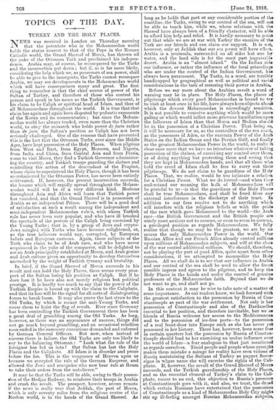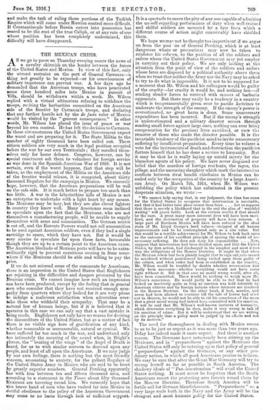TOPICS OF THE DAY.
TURKEY AND THE HOLY PLACES. NEWS was received in London on Thursday morning that the potentate who in the Mohammedan world holds the status nearest to that of the Pope in the Roman Catholic world, the Grand Shercef of Mecca, has thrown off the yoke of the Ottoman Turk and proclaimed his indepen- dence. Arabia may, of course, be reconquered by the Turks and the insurrection put down ; but if, as is far more likely, considering the help which we, as possessors of sea power, shall be able to give to the insurgents, the Turks cannot reconquer Arabia, we may see developments in the Mohammedan world which will have consequences many and great. The first thing to remember is that the chief source of power of the Sultan of Turkey, and therefore of those who control his person and speak in his name as the Turkish Government, is his claim to be Caliph or spiritual head of Islam, and thus of all Mohammedans throughout the world. It is true that that claim has again and again been disputed by pedantic exponents of the Koran and its commentaries ; but since the Moham- medan world has always tended, even more than the Christian world, to obey the monarch who holds power de Pete rather than de jure, the Sultan's position as Caliph has not been seriously challenged. One of the reasons that have prevented this is the fact that the Ottoman Turks, ever since the Middle Ages, have kept possession of the Holy Places. When pilgrims from West and East, from Egypt, Morocco, and Nigeria, from India and China, from Central Asia and from Persia, come to visit Mecca, they find a Turkish Governor administer- ing the country, and Turkish troops guarding the shrines and controlling the action of the descendant of the Prophet, whose claim to superintend the Holy Places, though it has been oa ershaclowed by the Ottoman Power, has never been entirely obliterated. If, however, the present insurrection succeeds, the lessons which will rapidly spread throughout the Moham- medan world will be of a very different kind. Moslems throughout Asia and Africa will learn that Turkish power has vanished, and that the Grand Shereef is in possession of Arabia as an independent Prince. There will be a good deal of satisfaction at such a result among the independent and semi-independent Mohammedan ralers, with whom Turkish rule has never been very popular, and who have ill brooked the spectacle of the powers of the Caliph being exercised by the Young Turks ; that is, by a group of Jews and crypto- Jews mingled with Turks who have become enlightened, or, as the true believers would say, corrupted, by European beliefs and European customs. Again, those subjects of the Turk who claim to be of Arab race, and who have never acquiesced in the yoke of the conqueror, will be delighted to see an Arab principality established at Mecca, and Arab genius and Arab culture given an opportunity to develop themselves uncrushed by the weight of Turkish tyranny and brutality.
In brief, if the Grand Shercef of Mecca succeeds in his revolt and can hold the Holy Places, there seems every pros- pect of the Sultan losing his position as Caliph. But if he does lose it he loses also not merely religious but political prestige. It is hardly too much to say that the power of the Turkish Empire is bound up with the claim to the Caliphate, and that its loss will be the signal for all sorts of disintegrating forces to break loose. It may also prove the last straw to the Old Turks, by which is meant the anti-Young Turks, and cause them to hoist the flag of revolt. Ever since Germany has been controlling the Turkish Government there has been a great deal of grumbling among the Old Turks. As long, however, as there was an appearance of success, things did not go much beyond grumbling, and an occasional rebellion soon ended in the summary executions demanded and enforced by German General Officers. But now, when instead of success there is failure, the Old Turks are only too likely to say to the balancing Ottoman : "Look what the rule of the foreigner has led us into! Our Sultan has lost the Holy Places and the Caliphate. All Islam is in disorder and prone before the foe. This is the vengeance of Heaven upon us because we accepted the rule of the German Emperor, and allowed the Jews and renegades who now bear rule at Roum to take their orders from tho unbeliever."
It may be that the Turks will be able, owing to their posses- Pion of the Hedjaz Railway, to reinforce their troops in Arabia and crush the revolt. The prospect, howdver, seems remote if the news is really true that Jeddah, the port of Mecca, which is only seventy miles from the religious centre of the Moslem world, is in the hands of the Grand Shored. As long as he holds that port or any considerable portion of the coastline, the Turks, owing to our control of the sea, will not be able to touch him, while we, whose relations with the Shereef have always been of a friendly character, will be able to afford him help and relief. It is hardly necessary to point out that while we are at war with Turkey the enemies of the Turk are our friends and can claim our support. It is not, however, only at Jeddah that our sea power will have effect. Arabia is a peninsula, surrounded on all sides but one by water, and the land side is for the most part implasalile desert. Arabia is an "almost island." On the Indian side our influence, or rather the influence of the local princelings who are under the control of the Indian Government, has always been paramount. Tile Turks, in a word, are tetribly handicapped by geographical as well as political and racial considerations in the task of restoring their power in Arabia, Before we say more about the Arabian revolt a word of warning may be in place. The Holy .Places, the places of pilgrimage which every good Mohammedan is bound to try to visit at least once in his life, have always been objects about which the devout Mohammedan is exceedingly sensitive. It is not possible to conceive anything which would be more galling or which would inflict more grievous humiliation upon the followers of Islam than that Mecca and Medina she-aid be in the possession of a Christian Power. That being so, it will be necessary for us, as the controllers of the sea coast, as the possessors of Aden, as the suzerain Power of the Arab States on the Indian Ocean and the Persian Gulf, and finally as the greatest Mohammedan Power in the world, to make it clear once more that we have no intention whatever of taking possession of the shrines, of exerciiing any control over them, or of doing anything but protecting them and seeing that they are kept in Mohammedan hands, and that all those who hold the creed of Islam shall be free to carry oat their pilgrimage. We do not claim to be guardians of the Holy Places. That, we realize, would be too intimate a relation for a Christian Power. What we do intend—and when they understand our meaning the balk of Mohammedans will be grateful to us—is that the guardians of the Holy Places shall be true Mohammedans, and shall be freed from any external interference in the discharge of their trust. In addition to our firm resolve not to do anything which will interfere with the religious beliefs or with the pride of the race which gave Mohammed to the world—the Arab race—the British Government and the British people are wisely most anxious not to assume, or even to seem to assume, a privileged position as regards Mohammedans. We fully realize that though we may be the greatest, we are by no means the only Mohammedan Power in the world. Our Russian Allies and our French Allies already control millions upon millions of Mohammedan subjects, and will at the close of the war control additional millions. We should, therefore, not be playing the part of good Allies, quite apart from other considerations, if we attempted to monopolize the Holy Places. All we shall do is to see that our influence in Arabia and our control of the sea shall be used to allow the freest possible ingress and egress to the pilgrims, and to keep the Holy Places in the hands and under the control of genuine professors of the Mohammedan faith. Beyond that we do not want to go, and shall not go.
In this context it may be wise to take note of a matter of some importance. As our readers know, we look forward with the greatest satisfaction to the possession by Russia of Con- stantinople as part of the war settlement. Not only is her possession of Constantinople and also of the Dardanelles essential to her position, and therefore inevitable, but we as friends of Russia welcome her access to the Mediterranean and to the possession of ice-free ports--to the possession of a real front-door into Europe such as she has never yea possessed in her history. There has, however, been some fear in certain quarters lest the possession by Russia of Constan- tinople should lead to her exercising an undue influence over the world of Islam—a fear analogous to that just mentioned as regards ourselves. Timid people and people whose eyesight makes them mistake a mirage for reality have seen visions of Russia maintaining the Sultans of Turkey as puppet Sover- eigns in whose name she will exercise the rights of the Cali- phate. If, however, the revolt of the Grand 6hereef of Mecca succeeds, and the Turkish guardianship of the Holy Places, and so the 'essential element of Turkey's claim to the Cali- phate, comes to an end, this objection to Russia's presence at Constantinople goes with it, and also, we trust, the draaa which certain Russians have entertained that the possession of Constantinople as a kind of Mohammedan Holy City might stir up ill-feeling amongst Russian Mohammedan subjects. and make the task of ruling those portions of the Turkish Empire which will come under Russian control more difficult. If Constantinople before Russia enters into possession has ceased to be the seat of the true Caliph, or at any rate of one whose position has been completely undermined, this difficulty will have disappeared.



































 Previous page
Previous page